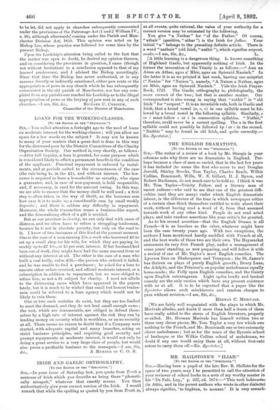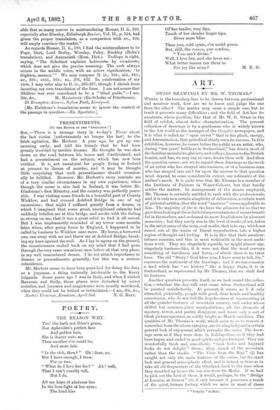MR. HAILSTONE'S "ILIAD."
[TO THE EDITOR OF THE "SPECTATOR."]
SIR,—Having been a pupil of the late Rev. R. Shilleto for the space of two years, may I be permitted to call the attention of your reviewer of school books to a note of my worthy master in his "De Pals. Leg.," p. 237, ed. 1874:—" This verb BEiMI011704$ (in Attic, and in the purest authors who wrote in other dialects) always signifies, to frighten, to menace.' It is very remark-
able that so many concur in mistranslating Homer, IL ii., 190, especially after Elmsley, Edinburgh Review, Vol. IL, p. 134, had given the proper translation, as a comparison with xv., 196, will amply convince the reader."
As regards Homer, U ii., 190, I find the mistranslators to be Pope, Dart, Lord Derby, Worsley, Paley, Buckley (Bohn's translation), and Autenrieth (Horn. Dict.). Trollop° is right, saying, "The Scholiast explains Ulakr(Ifeedi by EI;Ace.i3eigOat, which does not give the precise meaning. The verb always occurs in the middle voice, with an active signification, to frighten, menace." We may compare II. iv., 184; xiii., 810; xv., 196; xviii., 164; xx., 201, 432. In confirmation of my view, I may refer also to IL iv., 285-287, though I shrink from inserting my own translation of the lines. I am not aware that Shilleto was ever considered to be a "blind guide."—I am, Sir, &c., H. HAILSTONE (Ex-Scholar of Peterhouse). 26 Brompton Avenue, Sefton Park, Liverpool.
[Mr. Hailstone's translation seems to ignore the context of the passage in question.--En. Spectator.]



































 Previous page
Previous page